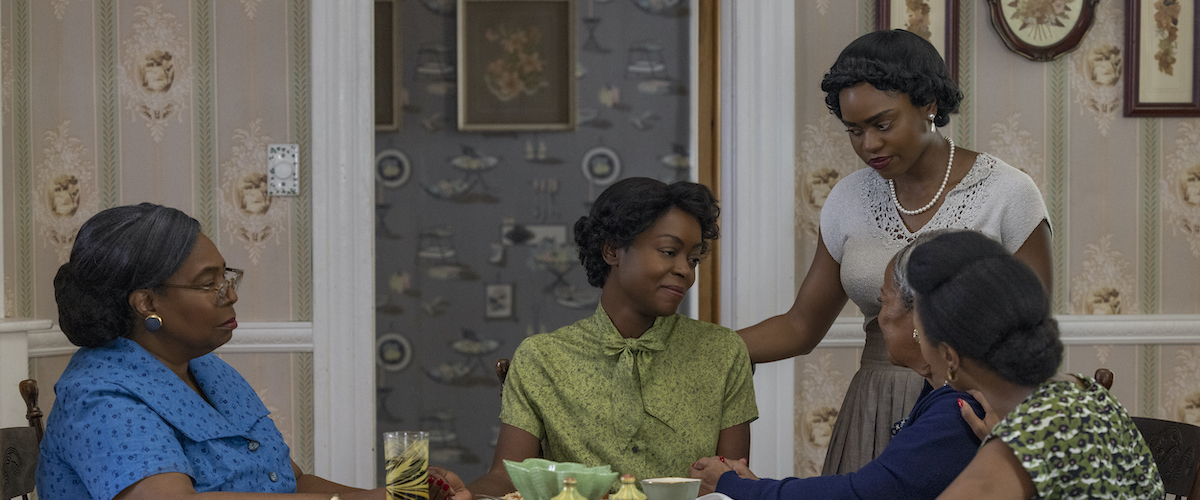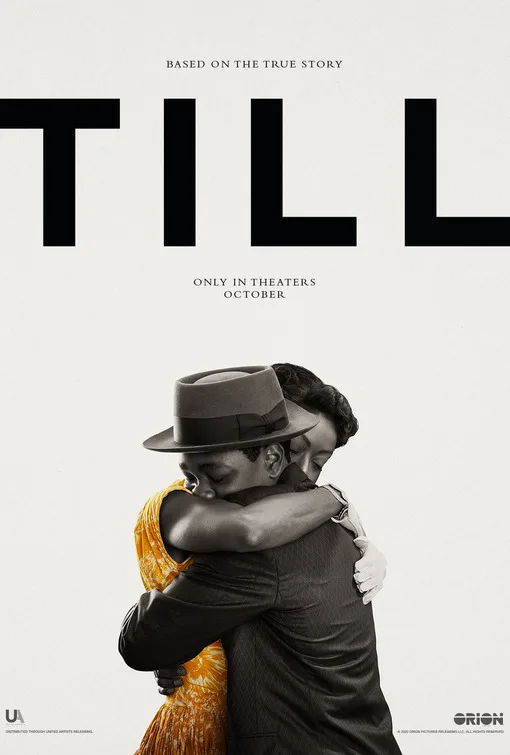“Till” tells the story of the murder of Emmett Till and the activism of his mother, Mamie Till-Mobley. It is the second retelling of this story in 2022, after the January ABC miniseries “Women of the Movement.” One may think that two filmed versions of the same story in such a short amount of time may be overkill. But the constant attempts by one political party to censor historical events that make White folks uncomfortable require these stories remain in the public consciousness. They have to be retold, much like the oral historians in my family passed Emmett Till’s story down to me when I was a little boy. Those who feel that these events are “in the past” and that we should get over them, need only be reminded of this New York Times article whose headline is “Emmett Till Memorial Has a New Sign. This Time, It’s Bulletproof.” As late as 2019, people were putting bullet holes in a sign that marked the site of a lynching.
Through Till-Mobley’s actions, we know about the death of her son, and how hideously he was brutalized. Director Chinonye Chukwu and her co-screenwriters, Keith Beauchamp and Michael Reilly aim to give viewers a glimpse of who Till was before he was murdered. Played by Jalyn Hall in the first third of the film, he’s the typical 14-year-old. Chukwu documents him getting dressed and ready for his trip down South to visit his cousins. He has the usual “but Mom” teenager moments with his mother, Mamie (Danielle Deadwyler), who in turn has the same moments with her own mother, Alma (Whoopi Goldberg). “That’s the ‘Mama, mind your business and go home’ face,” she says when Mamie silently expresses her displeasure over an opinion, a funny line in a film that is not without humor.
It’s Alma’s idea to send Emmett down to visit his Southern kin. Raised in Chicago, he had a different set of interactions with White people than his cousins Simeon (Tyrik Johnson) and great uncle “Preacher” Mose (John Douglas Thompson) would have, though the film implies that Emmett was unfamiliar with how dangerous slights against White people could be. Chicago is certainly not without racism, as a scene in a department store shows. The cousins joke about how funny it’ll look when their Yankee relative is down there helping Mose pick cotton on the farm where he sharecrops.
Before he leaves for Money, Mississippi, Mamie repeatedly broaches the subject of Southern dangers with Emmett, whom she calls Bo. Each time, he gives her the “but Mom!” teenager brush-off. She knew that a political organizer, Lamar Smith, had been murdered down there the week before for being “a rabble-rouser.” “Be small,” she tells him, which leads to gentle mockery from her son. He just wants to have fun and see the Mississippi Delta. In taking the time to show these scenes, including one where he dances with his mother to their favorite song, “Till” brings Emmett back to us as what he originally was, a teenager just starting his quest for some independence.
As we know, Emmett Till was murdered three days after he arrived in Money. On August 24, 1955, he interacted with 21-year-old Carolyn Bryant (Haley Bennett), a White woman who worked at a store frequented by Blacks. The stories varied as to the details of that encounter, and “Till” takes from several different sources. We see Emmett compare Bryant to a movie star before flashing a picture of a White girl that came with his wallet. That part of the story was disputed by Simeon Wright, who provided his own account of the events of that day in 2015. Wright did confirm Emmett wolf-whistling at Bryant, which the movie depicts. I thought that was a bit confusing, as I’d always been told that Emmett whistled before speaking to help with his stutter, and that was misconstrued by Bryant as meant for her.
No matter. What happens next is not in dispute. Though Chukwu keeps her press release promise not to depict any violence against her Black characters onscreen, she does show several White men and a few Black men forcibly retrieving Emmett from Preacher’s house. The anguish of Thompson’s performance here and the confusion Hall displays will haunt viewers long after the film is over, as will Hall’s off-camera screams in the brief scene where Chukwu alludes to his murder.
From here, “Till” focuses on Mamie Till-Mobley and her attempt to get justice after her son’s disappearance. Deadwyler is astonishingly good here, masterfully navigating every emotion we’d think a mother would have, and then a few we may not have originally considered. Her outrage is palpable as the NAACP lawyers ruthlessly interrogate her relationship with future husband Gene Mobley (Sean Patrick Thomas) and her brief marriage to ex-husband “Pink” Bradley. (Emmett’s father died in World War II.) Later, when her son’s body is found, Deadwyler does some of her best work in the film.
The way “Till” depicts Till-Mobley’s scenes with Emmett’s body are sure to be controversial. Chukwu keeps him obscured when his mother first enters the room, which led me to believe he would not be depicted. Then the camera lifts so we can see the full brunt of the damage done. Chukwu takes her time as we witness Deadwyler touching various parts of her son, sparing nothing. It felt overwhelming, and I was of two minds about this sequence. On the one hand, it felt a bit exploitative despite its undeniable power. On the other, Mamie Till-Mobley wanted the world to see what those men had done to her boy; so strong was her desire that she had an open casket funeral and put his body on the cover of Jet Magazine. Some criticized her for doing this, so in a way, “Till” is honoring this decision.
Anyone who has seen “Clemency,” Chukwu’s 2019 feature with Alfre Woodard, will recognize her love of her actor’s faces, and of the uncomfortable silences that punctuate their performances. When the film depicts Till-Mobley’s testimony in court, Deadwyler is Oscar-worthy. Watch how it looks as if she’s physically convulsing from loss at one moment, and how she then transitions to an unshakable certainty when faced with the defense’s lie that the body she buried was someone other than her son. Once Bryant takes the stand and spins her tale that she was almost raped by Emmett, Deadwyler is riveting in her righteous indignation as she walks out. “I know the verdict already,” she tells her lawyer.
Chukwu gets fine work from all of her actors, including the always welcome Frankie Faison as Mamie’s father. Goldberg is memorable in her few short scenes, and Jayme Lawson is also good in a role Goldberg once played, Myrlie Evers. Hall leaves a lasting impression as Emmett; his naturalistic performance makes him feel even more real to us. The haunting score by Abel Korzeniowski and the editing by Ron Patane ably assist the director in telling this story. Bobby Bukowski’s cinematography reminds us of how beautiful the South can look despite being a backdrop for so many horrible acts of racism.
One of the many things the civil rights movement demanded to see enacted was a federal anti-lynching law. In 2022, such a law was finally passed after decades of failed attempts. It was named after Emmett Till. That it took this long, and the idea that laws are being passed to ensure the reasons why aren’t taught in school, just highlight why “Till” feels so timely. Till’s murderers confessed to Look Magazine for $4,000 after being acquitted, and Carolyn Bryant is still alive and unpunished. That should be enough to justify this movie’s existence. If nothing else, see it for Danielle Deadwyler’s incredible performance. She truly is unforgettable.
This review was filed from the New York Film Festival premiere. “Till” will open on October 14th.




















